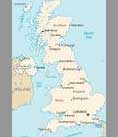|
|
|
|
|
|
|
|
|
|
By 10,000 BC, early humans learned that seeds would lead to the growing of crops. The Neolithic Revolution proved just that, and the results were greater harvests and a decrease in nomadic lifestyle. Hunters and gatherers gave way to tamers of animals and harvesters of crops. People now could stay in one place, which led to the rise of civilizations. Civilizations can be classified as a settled people with a government, local economy, and cultural and scientific advancements.
This is the heel stone -- it's purpose is most likely a place of observation.
On December 21, the sun would rise between the stones.
Behind me are the round barrows -- or burial grounds that surround the henge.
|
|
| Copyright 2004, 42 Pieces Productions, All rights reserved. | |
 |
 |
 |
 |
 |

 |



 Definition: Neolithic Revolution
Definition: Neolithic Revolution Stonehenge
is more than meets the eye. Many think it's merely the gigantic
sarsen stones and trilithons that make it so historical. But, the
fact is that archaeologygy
has dated the entire site to be much older than the stones
themselves. The area is complex with ditches,
round and long barrows (burial chambers), and chalk figures on
bordering towns. Stonehenge is a mystical experience -- though
mysterious, it seems that much of the mysticism was based on the
sun, the moon, and revolution around our orbit. A henge is a circle
... and Stonehenge is one of many such henges that existed in
England thousands of years ago.
Stonehenge
is more than meets the eye. Many think it's merely the gigantic
sarsen stones and trilithons that make it so historical. But, the
fact is that archaeologygy
has dated the entire site to be much older than the stones
themselves. The area is complex with ditches,
round and long barrows (burial chambers), and chalk figures on
bordering towns. Stonehenge is a mystical experience -- though
mysterious, it seems that much of the mysticism was based on the
sun, the moon, and revolution around our orbit. A henge is a circle
... and Stonehenge is one of many such henges that existed in
England thousands of years ago.

